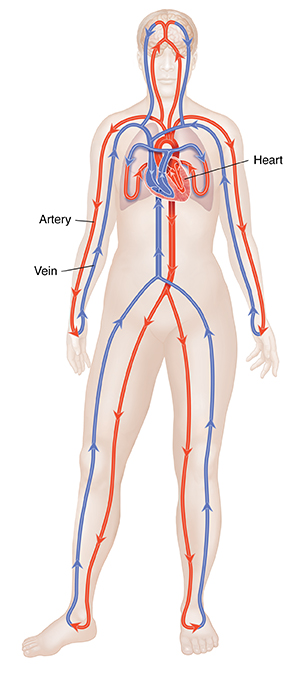Basic Anatomy of the Heart
About the heart
The heart is the hardest working muscle in the human body. The heart is located almost in the center of the chest. The adult human heart is about the size of a fist.
At rest, a normal heart rate for adults is 60 to 100 beats per minute. In a well-trained athlete, the resting heart rate can be healthy at a rate of 40 to 60 beats per minute. With exercise, the heart beats faster and the heart rate increases to get more oxygen to the muscles.
How the heart works
The cardiovascular system is made up of the heart and blood vessels. Its job is to circulate blood throughout your body. The blood brings oxygen and nutrients to the tissues.

The heart is made up of:
-
4 chambers (2 atria and 2 ventricles) that get blue (deoxygenated) blood from the body. They pump out red (oxygen-rich) blood back to it:
-
Blood vessels that include a network of arteries and veins that carry blood throughout the body:
-
4 valves to prevent backward flow of blood:
-
An electrical system that serves as a natural pacemaker. It also conducts electricity to stimulate the heart muscles to contract. This controls the rate and rhythm of the heartbeat.

Online Medical Reviewer:
Daphne Pierce-Smith RN MSN
Online Medical Reviewer:
Janet Campbell RN BSN
Online Medical Reviewer:
Tara Novick BSN MSN
Date Last Reviewed:
9/1/2025
© 2000-2026 The StayWell Company, LLC. All rights reserved. This information is not intended as a substitute for professional medical care. Always follow your healthcare professional's instructions.